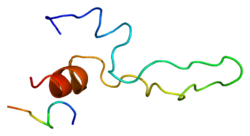Top Qs
Timeline
Chat
Perspective
Cholecystokinin A receptor
Protein-coding gene in the species Homo sapiens From Wikipedia, the free encyclopedia
Remove ads
The Cholecystokinin A receptor is a human protein, also known as CCKAR or CCK1, with CCK1 now being the IUPHAR-recommended name.
Remove ads
Function
This gene encodes a G-protein coupled receptor that binds sulfated members of the cholecystokinin (CCK) family of peptide hormones. This receptor is a major physiologic mediator of pancreatic enzyme secretion and smooth muscle contraction of the gallbladder and stomach. In the central and peripheral nervous system this receptor regulates satiety and the release of beta-endorphin and dopamine.[5]
The extracellular N-terminal domain of this protein adopts a tertiary structure consisting of a few helical turns and a disulfide-cross linked loop. It is required for interaction of the cholecystokinin A receptor with its corresponding hormonal ligand.[6]
Remove ads
Selective Ligands
Agonists
- Cholecystokinin
- CCK-4
- SR-146,131
- A-71623 - modified tetrapeptide, potent and selective CCKA agonist, IC50 3.7nM, 1200x selectivity over CCKB, CAS# 130408-77-4
Antagonists
- Proglumide
- Lorglumide
- Devazepide
- Dexloxiglumide
- Asperlicin
- SR-27897
- IQM-95333
- JNJ-17156516
See also
References
External links
Further reading
Wikiwand - on
Seamless Wikipedia browsing. On steroids.
Remove ads








